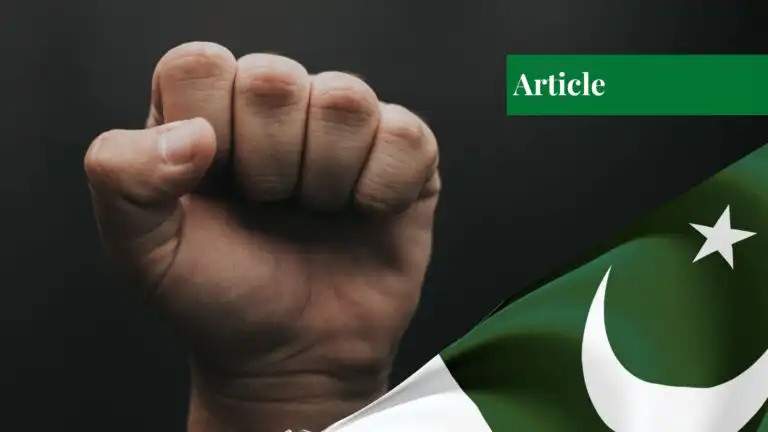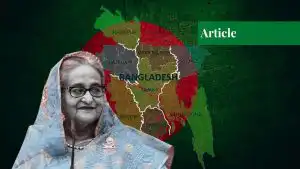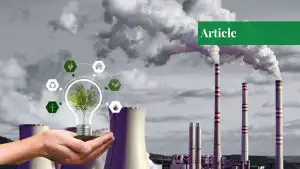It is a striking irony that in a world where innovation and scientific progress have connected humans in ways previously unimaginable, a significant chunk of the global population remains deprived of basic human rights. This situation is specifically prevalent in many “underdeveloped” countries, where colonialism and years of exploitation have instituted systems of economic deprivation, political polarization, and social inequality.
Findings of the HRCP’s Report
The recently issued annual report by the Human Rights Commission of Pakistan (HRCP) paints a grim picture of human rights in the country. It sheds light on the extremely significant and multifaceted nature of the challenges that the country confronts today. According to the report, 2023 was marked by “irreparable political divisions” in the country. The economic crisis also deepened with high inflation and low growth rates, propelling individuals to frequently come out and protest.
The political forces in the country also proved ineffective in many instances, specifically when it came to dealing with Afghan refugees and curbing the role of unelected and non-democratic forces in the system. Constraints on freedom of expression also continued to persist, with frequent censorship and attacks on media personnel. Simultaneously, freedom of assembly also remained limited, with political organizations and trade unions facing the wrath of law enforcement agencies when exercising their right to assembly.
With regard to women’s rights, a subject that has attracted significant discussion in the country over the past few years but has seen very little progress, much remained unchanged. The plight of women in the country continued to persist. Around 226 women are reported to have been victims of honor crimes in 2023. The Global Gender Gap report by the World Economic Forum also ranked Pakistan at 142 out of 146 countries across the globe.
Additionally, the report also delineates the issue of religious intolerance in the country. According to HRCP, 29 attacks occurred last year on the places of worship of religious minorities, and around 11 people lost their lives owing to faith-based killings. It also mentions the inhumane attack on Christian homes in Jaranwala.
Unfortunately, for those residing in the corridors of power, human rights in the country are marked by the pretense that all is as it should be. Recently, in a letter to the newly elected prime minister of Pakistan, Human Rights Watch emphasized that the incumbent government must make human rights a “key focus” by actively promoting and protecting human rights in the country. However, it’s more daunting than it may seem.
Reasons for the State of Human Rights in Pakistan
A careful analysis of the situation reveals that human rights violations in Pakistan have actually been a consequence of Pakistan’s security-centric approach to human rights. A weak polity combined with perceived external threats often paved the way for policies that prioritize safety and security over fundamental freedoms, civil liberties, and human rights. For example, a few years ago, in Balochistan, the BLF (a militant group), openly asserted that it would welcome all sorts of help from India against Pakistan.
It is important to note that the absence of national cohesion and integration in the country has significantly contributed to this animosity among the marginalized communities. The fragmentation of society based on ethnic and regional differences has complicated things to a greater extent. It has also allowed non-state actors and extremist organizations to manipulate the masses, resulting in increased human rights violations in the country. The frequent attacks on religious minorities, specifically on Christians and Hindus, are a prominent example.
This prompts us to consider another issue contributing to the deteriorating situation of human rights in the country: the lack of access to justice. According to statistics, by December 2023, the total number of pending cases in Pakistani courts amounted to 2.26 million. Moreover, the country ranked 130th out of 142 countries in the Rule of Law Index. These factors contribute significantly to why most of those encountering human rights abuses become hesitant to resort to courts for justice.
It is also pertinent to consider the economic impact of seeking justice. The monetary costs associated with pursuing legal action act as a major impediment to justice, specifically for those coming from low-income and marginalized backgrounds. According to the World Bank, around 40% of the Pakistani population currently lives near the poverty line, with around 98 million Pakistanis facing severe food insecurity. For these people, delays in legal processes, including court proceedings, end up disrupting their daily employment and business activities, further propelling them into poverty.
Today, Pakistan is among the few countries across the world where a considerable percentage of the entire population remains unaware of their fundamental rights, despite being a signatory to a range of human rights treaties and conventions, including the Universal Declaration on Human Rights (UDHR) and the International Covenant on Civil and Political Rights (ICCPR). The limited access people have to education in the country has contributed a lot to this. Simultaneously, cultural norms, including the tribal nature of society, often leave little or no room for individual freedoms.
Way Forward
This sorry state of affairs concerning human rights in the country establishes that it is high time the state as a whole adopts measures to ensure the protection of human rights in the country, that too for all communities, without any prejudice and discrimination towards anyone.
The first step is to ensure independent and strong human rights institutions. The Ministry of Human Rights (MHRC) has been playing an important role in upholding human rights in the country, however, there is still extensive room for improvement. Recently, an official from MHRC said that the ministry has been working to strengthen the regional directorates by bringing key provincial stakeholders together. These stakeholders would work together on legal and administrative reforms required to curb the human rights abuses in the country.
Simultaneously, legal reforms to protect human rights have also become a need of the hour. Recently, Amnesty International called on Prime Minister Shehbaz Sharif and urged him to address human rights issues in the country by adopting policies that are in accordance with international human rights standards. It gave a ten-point agenda which included legislative reforms such as amendments to the PEMRA ordinance, marking an end to laws criminalizing freedom of assembly, restoring the provisions of transgender persons act 2018, and suspending all the military trials of civilians.
Lastly, it is also important to ensure timely access to justice for those encountering human rights violations. To do so, specialized human rights tribunals can be created which can deal with cases related to human rights promptly. In remote and far-flung areas, where human rights abuses often go unnoticed and unreported, establishing mobile legal clinics can also make legal assistance and representation easier for the victims.
The thoroughly detailed situation of human rights in Pakistan that HRCP’s latest report has presented establishes the fact that increasing political polarization and deepening economic uncertainty are among the key factors contributing to the aggravation of human rights abuses in the country. Addressing these issues can be a slow and time-consuming process. However, as Pakistan tries to tackle these issues at home, both national and international stakeholders must support it and play their part in ensuring a more humane and just society.
If you want to submit your articles and/or research papers, please check the Submissions page.
The views and opinions expressed in this article/paper are the author’s own and do not necessarily reflect the editorial position of Paradigm Shift.






